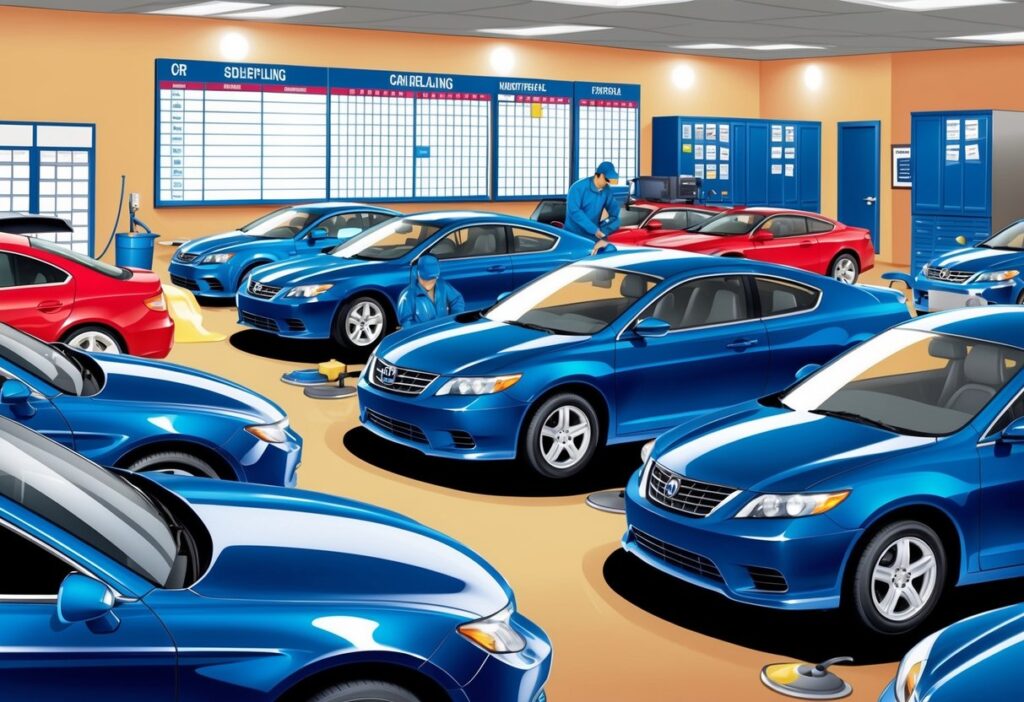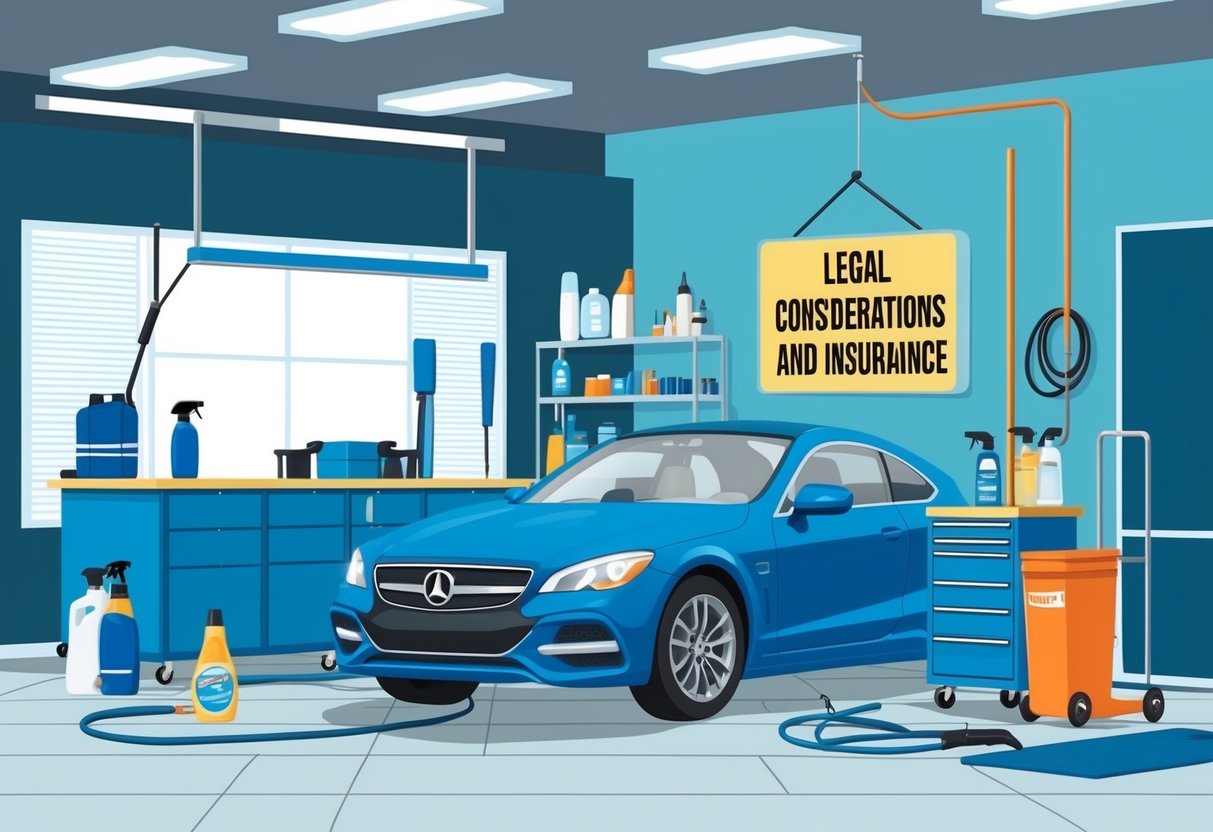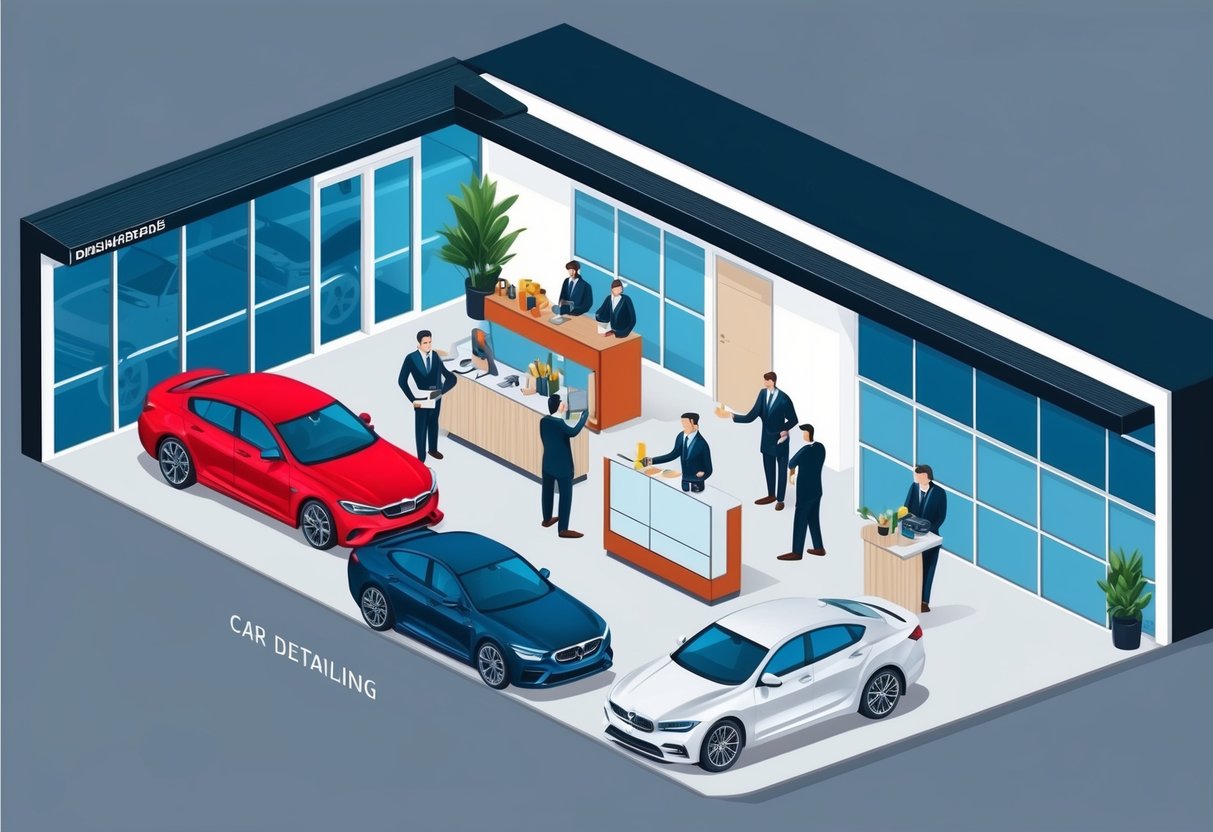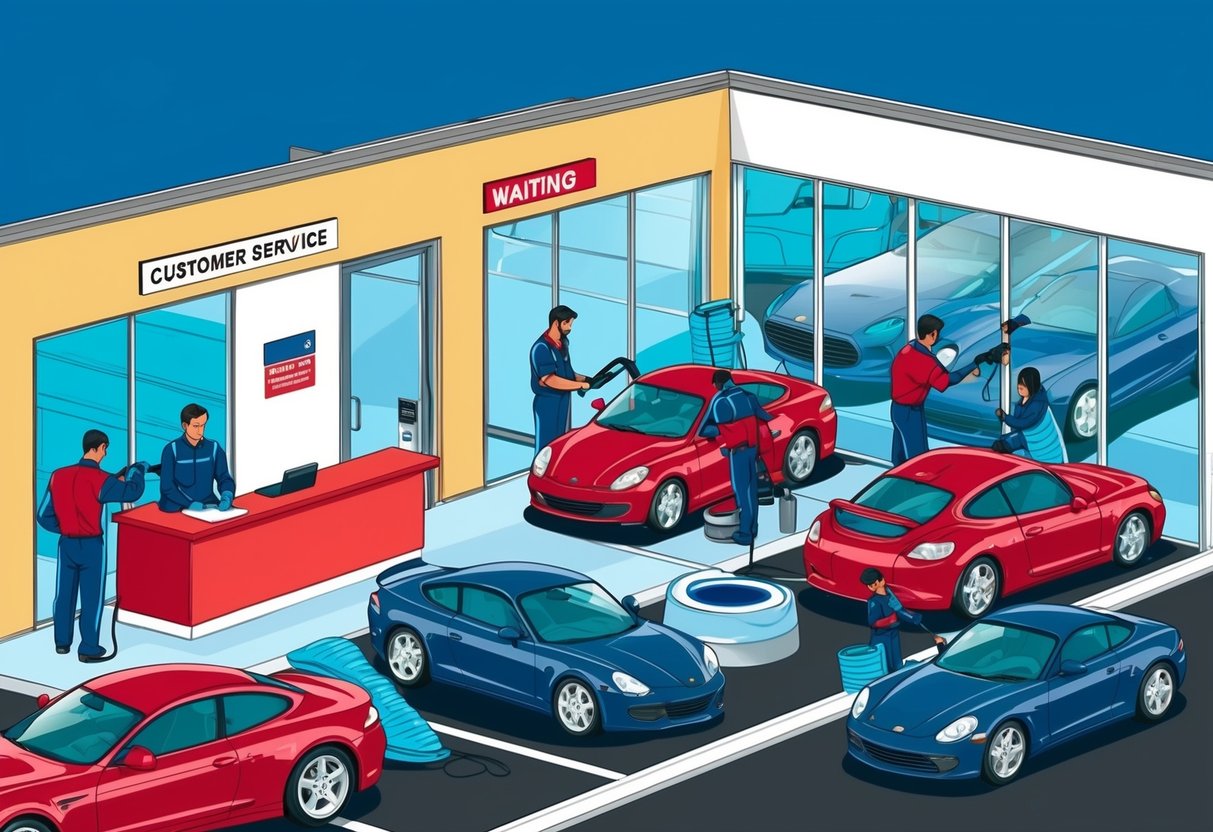Starting Your Car Detailing Business
I’m sure you are tired of searching the internet for car detailing business startup guides, only to be disappointed with hundreds of terrible search results. Well you can rest easy now! You have officially found the most authoritative article on the car detail business on the internet. We have spent hundreds of hours ensuring we help get your car detailing business off the ground with careful planning and strategic decisions.
Proper preparation in the early stages will help you build a strong foundation for long-term success.
Table of Contents
Creating a Business Plan
A solid business plan acts as your roadmap to success in the car detailing industry.
Start by defining your services—will you offer basic washing, full detailing, or specialized treatments like paint correction?
Research local competitors to understand market rates and identify gaps you can fill. For mobile car detailing businesses, analyze travel areas and potential client bases.
Include detailed financial projections covering startup costs, monthly expenses, and expected revenue.
Most new detailing businesses can launch with $500-$1,500 for basic equipment and supplies.
Your marketing strategy should outline how you’ll attract clients through social media, local advertising, or partnerships with related businesses like auto repair shops.
Choosing a Business Structure
The legal structure of your car detailing business affects taxes, liability, and paperwork requirements. Most small detailers start as sole proprietorships due to simplicity.
A Limited Liability Company (LLC) offers personal asset protection while avoiding the double taxation of corporations. LLCs separate your personal finances from business liabilities.
Sole proprietors file taxes using Schedule C of their personal tax returns. This is simpler but offers no liability protection.
Corporations provide maximum protection but involve more complex requirements and potential double taxation—the business pays taxes on profits, and shareholders pay taxes on dividends.
Securing Startup Capital
Most car detailing businesses can begin with relatively modest investment. Basic equipment includes pressure washers, vacuum cleaners, polishers, and quality cleaning products.
Create an itemized list of necessary equipment and supplies.
Focus on quality tools that will last rather than cutting corners with cheaper alternatives.
Funding options include:
- Personal savings
- Small business loans
- Equipment financing
- Credit cards (for short-term needs)
- Friends and family investments
Set aside additional funds for unexpected expenses and operating costs during the initial months when revenue might be lower than expected.
Finding the Right Location
Location significantly impacts your detailing business success. Mobile car detailing businesses avoid facility costs but require reliable transportation and portable equipment.
Fixed locations need adequate space for vehicles, water access, drainage systems, and customer waiting areas. Consider operating from home initially if zoning laws permit.
Business parks or areas near auto dealerships offer potential partnership opportunities. Look for locations with good visibility and easy access.
When selecting a business name, ensure it’s memorable, descriptive of your services, and available as a domain name. Check with your state’s business registry to confirm the name isn’t already taken.
Services and Specializations
Professional car detailing businesses offer a range of services that go far beyond a basic car wash. These specialized treatments help restore and maintain vehicles while addressing specific issues like paint imperfections, yellowed headlights, and deep-seated dirt or odors.
Standard Detailing Services
Standard detailing packages typically include both exterior and interior services.
For exteriors, detailers provide thorough washing, clay bar treatment to remove contaminants, polishing, and waxing to protect the paint. These treatments create a smooth, shiny finish that resists environmental damage.
Interior detailing involves vacuuming, steam cleaning upholstery, wiping down surfaces, and conditioning leather. Technicians clean vents, dashboard components, and hard-to-reach areas.
Most businesses offer tiered packages:
- Basic ($50-100): Wash, vacuum, wipe-down
- Standard ($100-150): Basic plus waxing and deeper interior cleaning
- Premium ($150-225): Comprehensive treatment including leather conditioning, engine cleaning
Advanced Paint Correction
Paint correction addresses scratches, swirl marks, oxidation, and water spots that diminish a vehicle’s appearance. This specialized service requires significant skill and specialized equipment.
The process typically includes:
- Assessment – Examining paint condition under specialized lighting
- Multi-stage polishing – Using progressively finer compounds
- Finishing – Final polishing for maximum gloss
Professionals use rotary or dual-action polishers with varying pads and compounds to remove imperfections without damaging the clear coat. This service typically costs $300-800 depending on vehicle size and paint condition.
Headlight Restoration Services
Headlight restoration reverses yellowing and cloudiness caused by UV exposure and oxidation. This service improves both aesthetics and safety by restoring visibility.
The restoration process involves:
- Cleaning and degreasing the lens surface
- Wet sanding with progressively finer grits (1000-3000)
- Polishing to restore clarity
- Applying UV protective coating to prevent future damage
Most detailers charge $50-100 for headlight restoration. Results typically last 1-2 years before UV protection needs renewal. Before-and-after demonstrations often convince customers of this service’s value.
Deep Cleaning and Sanitization
Deep cleaning services target stubborn stains, embedded dirt, and odors that regular cleaning can’t remove. Professional detailers use specialized extraction equipment and cleaning agents to restore interiors.
Key aspects include:
- Steam cleaning – Kills bacteria and removes stains without harsh chemicals
- Extraction – Removes deep dirt from carpets and upholstery
- Odor elimination – Treats sources rather than masking smells
- Sanitization – Removes allergens and pathogens
Many businesses now offer antimicrobial treatments that provide lasting protection against bacteria and viruses. These services are particularly valuable for rideshare drivers, families with children, or anyone concerned about vehicle hygiene.
Operations and Scheduling

Running a successful detailing business requires efficient operations and smart scheduling. The right systems help owners maximize productivity while delivering exceptional service to customers.
Setting Up Work Processes
Effective work processes form the foundation of any car detailing service.
Start by creating standard operating procedures (SOPs) for each detailing package you offer. These SOPs should outline exact steps, products to use, and time estimates.
Train all staff thoroughly on these procedures to ensure consistent quality. Many detailing businesses use checklists for different services to prevent mistakes and missed steps.
Time management is crucial. Track how long each service actually takes versus estimates. This helps with accurate scheduling and pricing.
Consider the layout of your workspace. Organize it to minimize wasted movement and maximize efficiency. Keep frequently used products within easy reach of work areas.
For mobile detailing operations, create systems for loading and unloading equipment efficiently. Proper vehicle setup can save 10-15 minutes per job.
Handling Customer Appointments
Modern detailing businesses benefit greatly from specialized scheduling software.
Programs like Urable, Jobber, and Orderry offer features designed specifically for auto detailing services.
These systems allow customers to book online 24/7, reducing phone calls and administrative work. They also send automatic appointment reminders, cutting down on no-shows.
When setting up your schedule, build in buffer time between appointments. Cars often arrive with unexpected issues that require extra attention.
Creating a clear cancellation policy is essential. Most successful detailing businesses require 24-hour notice to avoid cancellation fees.
For tax purposes, keep detailed records of all appointments and services rendered. This information is valuable when completing Schedule C forms for business income.
Managing Supplies and Inventory
Proper inventory management prevents service disruptions due to product shortages.
Create a system to track usage rates of cleaning solutions, waxes, and other consumables.
Set minimum threshold levels for each product. When inventory drops below these levels, reorder immediately. Consider bulk purchasing for frequently used items to reduce costs.
Store chemicals properly according to manufacturer guidelines. Many detailing products have specific temperature requirements and expiration dates.
Maintain equipment regularly to extend its lifespan. Document maintenance schedules for vacuum cleaners, pressure washers, and other machinery.
Track inventory costs carefully to ensure your pricing remains profitable. Many detailing businesses fail because they don’t account for all supply costs when setting service rates.
Marketing Your Detailing Service
Effective marketing is crucial for any auto detailing business. The right strategies can help attract new customers and retain existing ones, building a solid customer base for long-term success.
Branding and Online Presence
Creating a strong brand identity helps your detailing business stand out.
Choose a professional name, design a memorable logo, and select consistent colors that reflect quality and attention to detail.
Build a simple website that showcases your services, pricing, and contact information. Include high-quality before-and-after photos of vehicles you’ve detailed. This visual evidence is compelling for potential customers.
Establish profiles on social media platforms like Facebook and Instagram.
Post regular updates with photos of your work, special offers, and car care tips. Many mobile detailing businesses find success with video content showing transformation processes.
Create a Google My Business listing so local customers can find your detailing service when searching online. This improves visibility when people search for “auto detailing near me.”
Local Advertising Strategies
Word of mouth remains the most effective marketing method for auto detailing businesses.
Offer referral incentives to existing customers who bring in new clients.
Consider branded vehicle wraps for your detailing van or truck. A well-designed mobile billboard advertises your services wherever you go.
Connect with complementary businesses like car washes, repair shops, and dealerships. These partnerships can generate referrals for your mobile detailing service.
Attend local car shows and events to network with auto enthusiasts. Hand out business cards and offer special promotions to attendees.
Place flyers on bulletin boards at businesses where car owners frequent, such as coffee shops or car parts stores.
Leveraging Customer Reviews and Testimonials
Ask satisfied customers to leave reviews on Google, Yelp, and Facebook. Positive ratings significantly influence potential clients searching for auto detailing services.
Create a simple follow-up system to request feedback after each service. Send a thank-you message with links to your review profiles.
Display testimonials prominently on your website and social media pages. Include specific details about the quality of your work and customer service.
Consider offering incentives like discounts on future services for customers who provide reviews or testimonials. This encourages feedback while building customer loyalty.
Document exceptional results with before-and-after photos (with customer permission). These visual testimonials are powerful marketing tools for your detailing business.
Legal Considerations and Insurance

Operating a professional car detailing business requires proper legal preparation and protection. Taking care of these essential requirements will safeguard your business from potential risks and legal issues.
Understanding Zoning Laws
Zoning laws dictate where you can operate your detailing business. These regulations vary by location and can impact both mobile and fixed-location operations.
Before launching your business, check with your local zoning department to confirm if your planned location is properly zoned for commercial use.
Residential areas often have restrictions on commercial activities, including noise levels, operating hours, and water runoff.
Mobile detailers should verify if there are limitations on operating in certain neighborhoods or commercial properties. Some municipalities may require specific permits for mobile operations.
Violating zoning laws can result in fines, forced closure, or legal action. It’s best to address these requirements upfront rather than facing penalties later.
Acquiring the Necessary Permits
Every car detailing business needs specific permits and licenses to operate legally. These vary by state and local jurisdiction.
Common permits include:
- Business license
- Sales tax permit
- Wastewater disposal permit
- Environmental compliance permits
- Signage permits (for fixed locations)
Many cities require environmental permits due to concerns about chemical runoff. This may include installing proper drainage systems or water reclamation equipment.
Some states have special requirements for handling certain chemicals used in detailing. Check with your local Small Business Administration office for guidance on your specific location’s requirements.
Keep all permits current by renewing them before expiration dates. Display required licenses prominently at your business location to avoid potential fines.
Insurance Policies for Detailing Businesses
Proper insurance coverage is essential for protecting your detailing business from financial risks and legal liabilities.
General liability insurance is the foundation of business protection. It covers accidents, property damage, and injuries that might occur during your operations. For example, if you accidentally damage a customer’s vehicle or a client slips on wet surfaces at your location.
Forming an LLC (Limited Liability Company) provides personal asset protection by legally separating your business from your personal finances. This structure helps shield your personal property if your business faces lawsuits.
Additional coverage to consider includes:
- Garage keepers insurance (covering vehicles in your care)
- Commercial auto insurance (for mobile detailing vehicles)
- Workers’ compensation (if you have employees)
- Business interruption insurance
Insurance costs vary based on business size, services offered, and location. Get quotes from multiple providers to find appropriate coverage at competitive rates.
Recruitment and Staff Management

Finding and keeping good employees is critical for your detailing business success. Quality staff can make or break your reputation and directly impact customer satisfaction.
Hiring Skilled Car Detailers
When recruiting car detailers, look beyond basic qualifications. Seek candidates with a genuine passion for automobiles and attention to detail. Experience is valuable, but attitude often matters more.
Create clear job descriptions that outline specific skills needed and daily responsibilities. This helps attract the right people and sets proper expectations.
Consider where qualified candidates look for jobs. Industry forums, automotive school partnerships, and detailing certification programs can be excellent sources of talent.
During interviews, ask detailed questions about specific techniques and products. Watch for red flags like unwillingness to learn or inflexibility in methods.
Effective Interview Questions:
- What detailing processes do you follow?
- How do you handle difficult paint correction issues?
- What’s your approach to customer service?
Employee Training and Retention
Training is essential even for experienced detailers. Each business has unique standards and processes that employees must learn.
Create a structured training program covering basics to advanced techniques. Pair new hires with experienced staff for hands-on learning. Document standard procedures for consistency.
Show employees you value them through fair compensation and growth opportunities. Recognition for quality work builds loyalty and motivation.
Regular feedback helps staff improve and feel supported. Schedule monthly check-ins to discuss performance and address concerns before they become problems.
Invest in ongoing education. Send employees to certification programs or bring in industry experts for workshops. This improves skills and shows your commitment to their development.
Creating an Employee Handbook
A comprehensive employee handbook sets clear expectations and reduces confusion. It serves as a reference guide for both new and existing staff.
Include detailed sections on:
- Company policies and procedures
- Safety protocols and requirements
- Customer service standards
- Quality control expectations
- Disciplinary procedures
The handbook should outline your detailing business philosophy and standards. Be specific about processes, from vehicle intake to final quality checks.
Document proper use and maintenance of equipment. This prevents damage and extends the life of expensive tools.
Clearly state workplace rules regarding attendance, breaks, and professional conduct. Having these written down prevents misunderstandings later.
Review and update the handbook annually to reflect changes in your business practices or industry standards.
Frequently Asked Questions

Starting a car detailing business involves understanding certain key aspects of the industry. These include creating a solid business plan, knowing startup costs, acquiring essential equipment, setting competitive rates, operating from home, and navigating legal requirements.
How do I create a business plan for a car detailing service?
A comprehensive car detailing business plan should include market analysis, target customer profiles, and financial projections. Start by researching local competition and identifying potential service gaps.
Include detailed service offerings with pricing tiers from basic to premium packages. Outline your marketing strategy focusing on both digital presence and local advertising.
The financial section should cover startup costs, monthly expenses, and revenue forecasts for the first 1-3 years. Set realistic growth goals and include contingency plans for seasonal fluctuations.
What are the initial setup costs involved in opening a car detailing business?
Initial setup costs for a car detailing business typically range from $5,000 to $25,000 depending on scale. Equipment purchases represent the largest expense, accounting for approximately 60% of startup costs.
Facility rental deposits may cost $1,000-3,000 if not operating from home. Insurance premiums average $1,200-2,000 annually for basic liability coverage.
Business registration, permits, and licenses generally cost between $300-800 depending on location. Initial inventory of cleaning solutions and materials requires about $1,000-2,500.
What equipment is essential when starting a car detailing business?
Essential equipment includes a professional-grade vacuum system with various attachments for different surfaces. A pressure washer (1800-3000 PSI) is crucial for exterior cleaning.
Polishing and buffing machines with appropriate pads are necessary for paint correction services. Carpet extractors and steam cleaners help with deep interior cleaning.
Other necessities include quality microfiber towels, applicator pads, brushes of various sizes, and detailing clay. Storage solutions for organizing products and equipment are also important for efficiency.
What are the typical rates charged by professional car detailers?
Basic exterior wash and wax services typically range from $50-150 depending on vehicle size. Full interior detailing services average $100-200 for standard vehicles.
Complete detail packages combining interior and exterior services generally range from $150-300. Premium services like paint correction, ceramic coating, or leather restoration command $300-800 or more.
Mobile detailing services often include a convenience fee of $25-50 on top of standard rates. Many successful detailers offer tiered package options to accommodate different customer budgets.
How can someone start a car detailing business from their home?
Check local zoning laws and HOA regulations before starting a home-based detailing business. Some areas restrict commercial activities in residential neighborhoods.
Create a dedicated workspace with proper drainage and utilities. Mobile setups using portable equipment can be an alternative if space is limited.
Invest in water reclamation systems to comply with environmental regulations. Consider noise limitations when operating equipment in residential areas.
Liability insurance is essential even for home-based operations. Many successful home detailers start with mobile services to build clientele without facility overhead.
What are the legal considerations when establishing a car detailing business in the USA?
Register your business structure (LLC, sole proprietorship, etc.) with state authorities. This affects taxation and personal liability protection.
Obtain a business license from your city or county government.
Additional permits may be required for wastewater management or chemical storage.
Secure appropriate insurance coverage including general liability and garage keepers insurance. Coverage of $1-2 million is standard for the industry.
Comply with environmental regulations regarding chemical disposal and water runoff.
The EPA and local water authorities have specific guidelines for automotive businesses.
Tax considerations include collecting sales tax for services depending on state requirements.
Proper employee classification is essential if hiring staff.
